- Home
- Patricia Cornwell
The Scarpetta Factor Page 6
The Scarpetta Factor Read online
Page 6
The lives they led, filled with secrets like rooms that held as much shadow as light. Their long pilgrimage together was mapped by independent detours and destinations not always known to each other, but as difficult as it was for her, in many ways it was worse for him. There were few occasions when it was unethical for her to have case discussions with her forensic psychologist husband and seek his opinion and advice, but rarely could she return the favor. Benton’s patients were alive and enjoyed certain rights and privileges that Scarpetta’s dead patients didn’t. Unless someone was a danger to himself or others or convicted of a crime, Benton couldn’t discuss the person with Scarpetta without violating patient confidentiality.
“At some point we need to talk about when we’re going home.” Benton had turned to the topic of the holidays and a life in Massachusetts that was becoming increasingly distant. “Justine’s wondering if she should decorate the house. Maybe string a few white lights in the trees.”
“Good idea if it looks like someone’s there, I suppose,” Scarpetta said, skimming through e-mail. “Keeps the burglars away, and based on everything I hear, burglaries and robberies are going through the roof. Let’s do some lights. In the boxwoods, maybe just on either side of the front door and in the garden.”
“I take that as a no to doing anything else.”
“With what’s going on here,” she said, “I have no idea where we’ll be in a week. I’ve got a really bad case, and people are fighting.”
“I’m making a note of it. Lights to scare away the burglars. The rest, why bother.”
“I’ll pick up a few amaryllises for the apartment, maybe a tiny fir tree we can replant,” she said. “And hopefully we can get home for a few days if that’s what you want.”
“I don’t know what I want. Maybe we should just plan on staying here. Then it’s not a question anymore. How about that? Deal? Have we decided? Put together a dinner or something? Jaime and Lucy. And Marino, I guess.”
“You guess.”
“Sure. If you want him.”
Benton wasn’t going to say he wanted Marino. He didn’t. No point in pretending.
“Deal,” she said, but she didn’t feel good about it. “We’ll stay in New York.” She started feeling really bad about it, now that it was decided.
She thought of their two-story bungalow-style house, built in 1910, a simple harmony of timber, plaster, and stone that reminded her daily of how much she adored Frank Lloyd Wright. For an instant she missed her big kitchen with its commercial-grade stainless-steel appliances. She missed the master bedroom with its deep-set skylights and exposed-brick flue.
“Either way. Here or home,” she added. “As long as we’re together.”
“Let me ask you something,” Benton said. “You haven’t gotten any unusual communications, like maybe a greeting card, maybe something sent to your office in Massachusetts or the OCME here in New York or maybe to CNN?”
“A greeting card? From anybody in particular?”
“Just wondering if you’ve gotten anything unusual.”
“E-mails, e-cards, mostly what I get from strangers is sent to CNN, and fortunately, other people go through it.”
“I don’t mean fan mail, exactly. I mean like a talking or singing card. Not an e-card. A real one,” he said.
“Sounds like you have someone in mind.”
“It’s just a question.” He had someone in mind. A patient. Maybe the dragon he had to slay.
“No,” she said, opening an e-mail from the chief. Good. He was in his office, would be until five.
“We don’t need to discuss it.” Meaning Benton wasn’t going to discuss it. “Call me when you’re ready to leave and I’ll meet you out front,” he said. “I’ve missed you today.”
Benton pulled on a pair of cotton examination gloves and removed a FedEx pouch and a Christmas card from the plastic evidence bag he had tucked them in earlier today.
It disturbed him that the unseemly holiday greeting had been sent to him here at Bellevue. How could Dodie Hodge, who had been discharged from McLean five days ago, know Benton was at Bellevue right now? How did she have any idea where he was, for that matter? Benton had considered a number of possibilities, had been obsessing about them all day, the specter of Dodie bringing out the cop in him, not the mental health practitioner.
He supposed it was possible she had seen the commercials on TV about Scarpetta’s live appearance on The Crispin Report tonight and had assumed Benton would accompany his wife, especially this close to the holidays. Dodie might then deduce that if he was going to be in the city, he’d drop by Bellevue, at least check his mail. It was also possible that her psychiatric condition was deteriorating now that she was home, that her insomnia had worsened, or that she simply wasn’t getting the fix of excitement she craved. But no explanation Benton had come up with satisfied him, and as hours had passed, he’d become more unsettled and vigilant, not less. He worried that Dodie’s disturbing gesture was out of character, not what he would have predicted, and that she might not have acted alone. And he worried about himself. It seemed she had awakened certain inclinations and behaviors in him that were unacceptable to his profession. Not that he’d been himself of late. Because he hadn’t been.
The card’s red envelope was blank, nothing on it, not Benton’s name or Scarpetta’s or Dodie Hodge’s. That much was consistent with what he knew about her, at least. While she was at McLean she’d refused to write. She’d refused to draw. At first she’d claimed she was shy. Then she decided the medication she was taking during her hospitalization had caused tremors and impaired her coordination, making it impossible for her to copy the simplest sequence of geometric designs or connect numbers in a certain order or sort cards or manipulate blocks. For almost a month, all she had done was act out, stir up trouble, complain, lecture, advise, pry, lie, and talk to anyone who would listen, sometimes at the top of her lungs. She couldn’t get enough of her self-aggrandizing dramas and magical thinking, was the star in her own movie and her own biggest fan.
There was no personality disorder Benton dreaded more than the histrionic, and from the moment of Dodie’s arrest in Detroit, Michigan, for misdemeanor petty theft and disorderly conduct, it had been the goal of all involved to get her psychiatric care and as far away from them as possible. No one wanted anything to do with this bombastic woman who was shrieking and wailing in Betty’s Bookstore Café that she was the aunt of movie star Hap Judd, that she was on his “free list” and therefore it wasn’t stealing to stuff four of his action movie DVDs into the front of her pants. Even Betty herself was happy to drop the charges as long as Dodie never stepped foot in her store again or in Detroit or the state of Michigan. The deal was that Dodie had to be hospitalized for a minimum of three weeks, and if she complied, the case would go away.
She had cooperated with the stipulation that she was to be admitted to McLean because it was where VIPs, the rich and famous, go and was convenient to her estate in Greenwich, Connecticut, and also to Salem, where she liked to shop in various witcheries and do readings and rituals for hire and offer for a price the gifts of The Craft. She insisted that for the amount of money her private hospitalization would cost her, she was to be paired with the most established and prominent forensic expert available, a male with at minimum a Ph.D. and a background with the FBI, in addition to an open mind about the supernatural and a tolerance of other faiths, including the Old Religion.
Dodie’s first choice was the forensic psychiatrist Dr. Warner Agee because he was a former FBI profiler, according to her, and on TV. The request was denied. For one thing, Agee had no affiliation with McLean, and for another, the Detroit DA’s office wanted no association with the Dr. Phil of forensics, as they referred to him. Agee’s name being introduced into the mix was enough to send Benton the other way, no matter who the patient was—he despised the man that much. But Benton had a professional obligation to McLean, and it was his bad luck to be the obvious candidate for the onerous assi
gnment of evaluating this woman who claimed to be a witch with ties to celebrity. The goal was to keep her out of court and out of jail—not that any jail on the planet would want her.
During the four weeks she had been a patient, Benton had spent as much time as possible in New York, not only to be with Scarpetta but to be away from Dodie. He’d been so relieved when she was discharged this past Sunday afternoon, he’d checked several times to make sure she’d actually been picked up and driven home, not to an estate in Greenwich, because that was another lie. She’d been deposited at a small house in Edgewater, New Jersey, where she apparently lived alone, having gone through four husbands, all dead or having fled years ago. Poor bastards.
Benton picked up the phone and dialed the extension of Bellevue’s chief of forensic psychiatry, Dr. Nathan Clark, and asked if he had a minute. While Benton waited, he looked at the FedEx envelope again, certain details continuing to perplex and concern him and prompt him to act in ways he knew he shouldn’t. There was no return address on the airbill, and his address here at Bellevue was handwritten in a functional calligraphy that was so precise it looked like a printed typeface. Not at all what he would have expected from someone like Dodie, whose only writing while she’d been at McLean was a large, looping scrawl when she’d had to sign her name on various forms. He slid the thick glossy card out of its envelope, a big fat Santa on the front of it being chased by a furious rolling pin-wielding Mrs. Claus, and the caption “Who Are You Calling a Ho!” He opened the card and Dodie Hodge’s recorded off-key voice began to sing, to the tune of “A Holly, Jolly Christmas”:
Have a Ho-Dee, Do-Dee Christmas
And When You Think of Me
Stick Some Mistletoe Where It Ought to Go
And Hang an Angel from Your Tree
Merry, Merry Christmas, Benton and Kay!
Over and over, the same maddening lyrics and greeting in her childish, breathy voice.
“Not exactly Burl Ives,” Dr. Clark said as he walked in with his coat, his hat, his beat-up leather satchel with its long strap that reminded Benton of a mailbag from the days of the pony express and covered wagons.
“If you can stand it, it will keep going until the recording time runs out,” Benton said. “Exactly four minutes.”
Dr. Clark placed his belongings in a chair and came over to where Benton sat, leaning close to get a look at the card, steadying himself by placing both hands on the edge of the desk. In his early seventies, he’d recently been diagnosed with Parkinson’s disease, a cruel punishment for a gifted man whose body had always been as agile as his mind. Tennis, skiing, mountain climbing, piloting his own plane—there wasn’t much he hadn’t tried and succeeded at, his love of life boundless. He’d been cheated by biology, by genetics, by the environment, maybe something as mundane as exposure to lead paint or old plumbing that had caused free-radical damage to the basal ganglia of his remarkable brain. Who the hell knew how he’d ended up with such a scourge. But it was advancing rapidly. Already he was stooped, his movements retarded and clumsy.
Benton closed the card, and Dodie’s voice abruptly stopped mid-lyric. “Homemade, obviously,” he said. “The typical talking card has a recording time of as little as ten seconds, maybe as long as forty-five, but not four minutes. From what I understand, the way you create a longer recording is to buy a bare voice module that has more memory. You can order them on the Internet, then basically build your own greeting card. Which is what this particular former patient of mine did. Or someone did it for her.”
He picked up the card in his white cotton-gloved hands and turned it at different angles so Dr. Clark could see the edges, see how it had been pieced together with exactness and care.
“She found this greeting card, or someone did,” Benton continued to explain, “and made her recording on a module, which was glued to the inside, then a square of paper was glued over it, possibly the blank side of another greeting card that was cut out. Which is why the inside of her card is completely blank. She didn’t write anything on it. She didn’t write anything the entire time she was at McLean. She says she doesn’t write.”
“Graphophobic?”
“That and medication, so she says.”
“A perfectionist who can’t cope with criticism.” Dr. Clark went around to the other side of the desk.
“A malingerer.”
“Ah. A factitious disorder. For what motive?” Already Dr. Clark wasn’t trusting what Benton was saying.
“Money and attention are her two strongest motivating forces. But maybe there’s something else,” Benton said. “I’m beginning to wonder who and what we had at McLean for a month. And why.”
Dr. Clark sat slowly, carefully, the smallest physical act no longer taken for granted by him. Benton noticed how much his colleague had aged just since the summer.
“I’m sorry to bother you about this,” Benton added. “I know you’re busy.”
“Never a bother, Benton. I’ve missed talking to you and have been thinking I should call. I’ve been wondering how you are.” Dr. Clark said it as if they had things to talk about and Benton had been elusive. “So she refused pencil-and-paper tests.”
“Wouldn’t do the Bender Gestalt, Rey-Osterrieth Complex Figure drawing, digit symbol substitution, letter cancellation, not even trail making,” Benton said. “Nothing that required her to write or draw.”
“What about psychomotor function tests?”
“No block designs or grooved pegboard, no finger tapping.”
“Interesting. Nothing that measures reaction time.”
“Her latest excuse was the medication she was taking, said it gave her tremors, caused her hands to shake so badly she couldn’t hold a pen and she didn’t want to humiliate herself by trying to write or draw or manipulate objects.” Benton couldn’t help but think of Dr. Clark’s own condition as he explained Dodie Hodge’s alleged complaints.
“Nothing that requires her to physically perform on demand, nothing that might, in her mind, invite criticism, judgment. She doesn’t want to be scored.” Dr. Clark stared out the window behind Benton’s head, as if there was something to look at besides beige hospital brick and the encroaching night. “What medication?”
“My guess, nothing now. She’s not exactly compliant and has no interest in substances unless they make her feel good. Alcohol, for example. While she was hospitalized, she was taking Risperdal.”
“Which can cause tardive dyskinesia. But atypically,” Dr. Clark considered.
“She wasn’t having muscle spasms or twitches except ones she faked,” Benton said. “Of course, she claims her condition is permanent.”
“Theoretically a possible permanent side effect from Risperdal, especially in older women.”
“In her case, it’s malingering, it’s bullshit. She has some agenda,” Benton repeated. “Thank God I followed my instincts, mandated that all of my sessions with her be recorded on video.”
“And how did she feel about that?”
“She dressed the part. Whatever character came to mind, whatever her mood. Seductress or Salvation Army or Strega.”
“Do you fear she could be violent?” Dr. Clark asked.
“She has violent preoccupations, claims to have recovered memories of satanic cult abuse, her father killing children on stone altars and having sexual intercourse with her. No evidence that any such thing ever occurred.”
“And what evidence might there be?”
Benton didn’t answer. He wasn’t allowed to check on a patient’s veracity. He wasn’t supposed to investigate. It was so counterintuitive for him to operate this way, it was almost intolerable, and the boundaries were blurring.
“Doesn’t like to write but likes drama,” Dr. Clark said, watching him closely.
“Drama is the common denominator,” Benton said, and he knew Dr. Clark was already on the road to truth.
He sensed what Benton had done—or that he had done something. It occurred to Benton that subconsciously he’d o
rchestrated the conversation about Dodie because he really needed to talk about himself.
“Her insatiable need for drama and a sleep disturbance she’s suffered from most of her life,” Benton went on. “She was tested in the sleep lab at McLean and apparently has participated in a number of actigraphy studies over the years, clearly has a circadian rhythm disorder, suffers from chronic insomnia. The worse it gets, the poorer her judgment and insight, the more chaoic her lifestyle. Her fund of knowledge is extraordinarily good. She’s within the bright-superior range of intelligence.”
“Any improvement on the Risperdal?”
“Her mood was somewhat stabilized, not as hypomanic, reported that she was sleeping better.”
“If she’s stopped her medication, she’s likely getting worse. How old?” Dr. Clark asked.
“Fifty-six.”
“Bipolar? Schizophrenic?”
“Would be more treatable if she was. Axis-two personality disorder, histrionic with borderline and antisocial traits.”
“Lovely. And why was she prescribed Risperdal?”
“On admission last month, she seemed to be suffering from delusions and false beliefs, but in fact, she’s a pathological liar.” Benton went on to give a brief history of Dodie’s arrest in Detroit.
“Any chance she’ll accuse you of violating her civil rights, claim the hospitalization was against her will, that she was coerced and forced to take a medication that permanently impaired her?” Dr. Clark asked.
“She signed a conditional voluntary, was given a civil rights packet and notice of her rights to legal consultation and all the rest. At the moment, it’s not litigation I’m concerned about, Nathan.”

 Blow Fly
Blow Fly Unnatural Exposure
Unnatural Exposure The Bone Bed
The Bone Bed Book of the Dead
Book of the Dead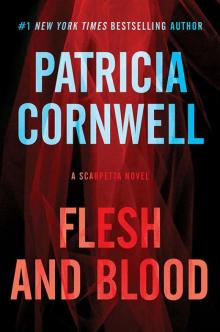 Flesh and Blood: A Scarpetta Novel (Scarpetta Novels Book 22)
Flesh and Blood: A Scarpetta Novel (Scarpetta Novels Book 22) Red Mist
Red Mist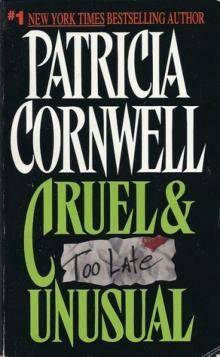 Cruel & Unusual
Cruel & Unusual Hornet's Nest
Hornet's Nest Four Scarpetta Novels
Four Scarpetta Novels Scarpetta's Winter Table
Scarpetta's Winter Table Isle of Dogs
Isle of Dogs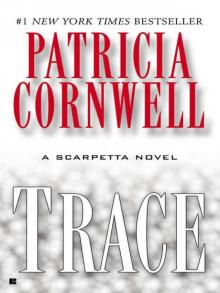 Trace
Trace Postmortem
Postmortem Body of Evidence ks-2
Body of Evidence ks-2 Southern Cross
Southern Cross All That Remains
All That Remains Point of Origin
Point of Origin Depraved Heart
Depraved Heart Ruth, a Portrait: The Story of Ruth Bell Graham
Ruth, a Portrait: The Story of Ruth Bell Graham From Potter's Field
From Potter's Field Flesh and Blood
Flesh and Blood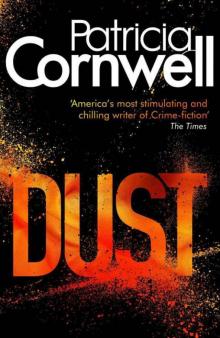 Dust
Dust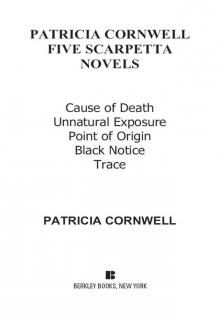 The Body Farm
The Body Farm Port Mortuary
Port Mortuary Quantum
Quantum Portrait of a Killer: Jack the Ripper - Case Closed
Portrait of a Killer: Jack the Ripper - Case Closed Spin (Captain Chase)
Spin (Captain Chase) Cause of Death
Cause of Death The Scarpetta Factor
The Scarpetta Factor Predator
Predator Scarpetta 18 - Port Mortuary
Scarpetta 18 - Port Mortuary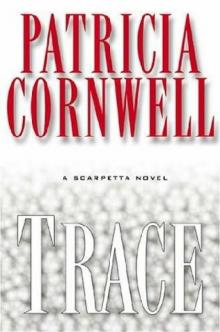 Trace ks-13
Trace ks-13 Portrait of a Killer
Portrait of a Killer Cruel and Unusual ks-4
Cruel and Unusual ks-4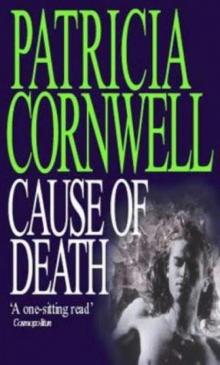 Cause Of Death ks-7
Cause Of Death ks-7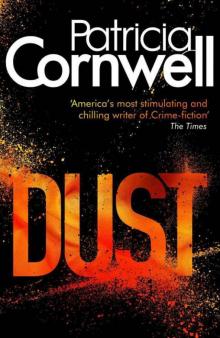 Dust ks-21
Dust ks-21 At Risk wg-1
At Risk wg-1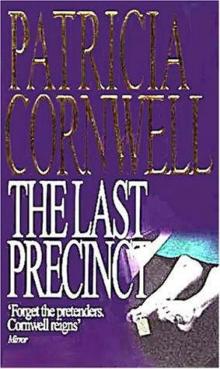 The Last Precinct ks-11
The Last Precinct ks-11 Book of the Dead ks-15
Book of the Dead ks-15 All That Remains ks-3
All That Remains ks-3 Ruth, a Portrait
Ruth, a Portrait Scarpetta's Winter Table (kay scarpetta)
Scarpetta's Winter Table (kay scarpetta) From Potter's Field ks-6
From Potter's Field ks-6 Scarpetta
Scarpetta Isle of Dogs jhabavw-3
Isle of Dogs jhabavw-3 Hornet's Nest jhabavw-1
Hornet's Nest jhabavw-1 The Body Farm ks-5
The Body Farm ks-5 Blow Fly ks-12
Blow Fly ks-12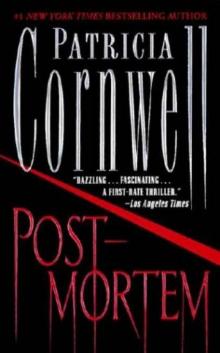 Post Mortem
Post Mortem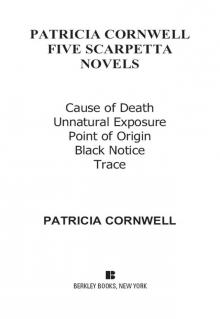 Five Scarpetta Novels
Five Scarpetta Novels Chasing the Ripper (Kindle Single)
Chasing the Ripper (Kindle Single) Point of Origin ks-9
Point of Origin ks-9 Port Mortuary (2010)
Port Mortuary (2010) Unnatural Exposure ks-8
Unnatural Exposure ks-8 Southern Cross uhabavw-2
Southern Cross uhabavw-2 The Bone Bed ks-20
The Bone Bed ks-20 Red Mist ks-19
Red Mist ks-19 Port Mortuary (2010) ks-18
Port Mortuary (2010) ks-18 Predator ks-14
Predator ks-14